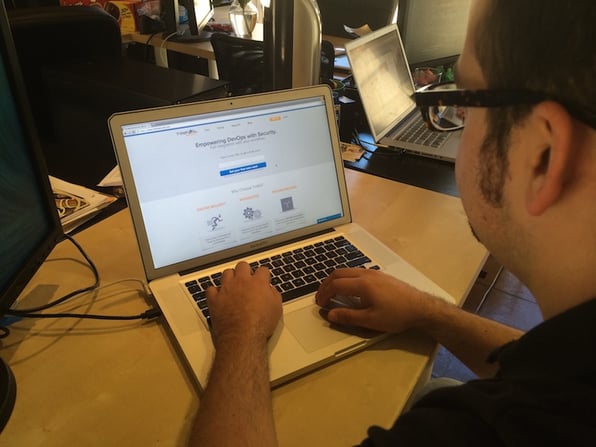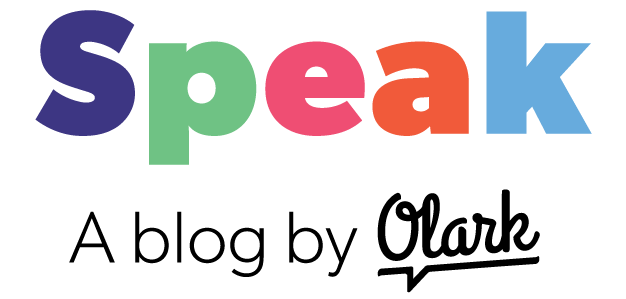Today's case study comes from Michael Borohovski, co-founder and CTO at Tinfoil Security.
I fell in love with Olark shortly after my co-founder, Ainsley Braun, and I started Tinfoil Security in 2011, mostly because I'm extroverted and gregarious by nature. I'm the type of guy who is absolutely willing to hop on a site, see an Olark chat, and start a conversation. Remarkably, this is exactly how we met one of our future advisors, now also a good friend. We’ve been using Olark for four years now, and while not every chat has led to serendipitous meetings, enough conversations have led to unexpected outcomes that I find it an invaluable resource for meeting people and learning more about our customers.
We’ve been using Olark for four years now, and while not every chat has led to serendipitous meetings, enough conversations have led to unexpected outcomes that I find it an invaluable resource for meeting people and learning more about our customers.
We started Tinfoil Security back in 2011 because we were tired of seeing our own information insecure on the Web. Thus, Tinfoil is “security for DevOps”: an easy-to-use, developer-friendly service that lets users scan their website for vulnerabilities,so they can fix them quickly and easily. We streamline the security process and focus on developers, serving as the first security scanning solution to easily integrate into your DevOps and development processes.
Only two things have changed here at Tinfoil in those four years: we have a bigger team now, and we have more customers.
So, I'd like to share how we've scaled our chat support along the way and some of the important challenges we've had to overcome.
Increasing the Number of Sales Chats
To provide some context, we typically see about 10-30 Olark conversations per week. We use live chat for support and sales: probably 80% for support, and 20% for sales. Often though, support can lead into sales, so I've lumped that into the 'support' category, but it's hard to measure in that regard.
As we've grown, we've seen a steady increase in the number of chats we get that are sales-related, or that result in a sale, which is great! But it's required some reconfiguring in our approach to chat.
Our support team will often recognize a support opportunity that is actually also a sales opportunity, and will set up a conversation with our sales team or simply !transfer them over. This usually occurs due to the customer asking about features that are typically open only to the enterprise, or exploring bulk pricing, or any number of other questions that aren’t directly related to technical support but need answers nonetheless.
Balancing Support and Product Development
Our support system has changed over the years as we've grown to have a lot more customers, and it's been an interesting ride trying to balance incredible support, which we consider to be a point of pride, with product development. Sometimes they can clash, and we're constantly trying to strike the right balance between the two. It usually shifts in one direction or the other as the team changes and our customer base grows, and every now and again we have to reassess and reset that balance.
Why would they clash? It’s simple, really: it’s incredibly difficult to grow both your support expertise and your product expertise at precisely the same pace. Inevitably, one outpaces the other a bit, at which point we figure out why that occurred and try and prevent it from occurring in the future. Over time, they will hopefully grow completely in tandem, but it’s important to keep reinvesting in both product development and support, to make sure neither is slipping behind the other too much.
All Hands Support at Tinfoil
Everyone at Tinfoil takes a turn on chat - not just every new employee, but every employee. We think it's imperative that every single employee, including the founders and executive team, spends some time supporting customers. We genuinely believe that talking to our customers is the only way to stay in touch with what problems they are facing and how our product needs to evolve.
We don't have a dedicated support team: we have a primary and secondary support team for each day, which rotates daily. Primary support makes it their job to handle support for that day, including live chat. If the primary support team is busy or dealing with other customers, the secondary team jumps in to help fulfill those duties.
When new employees get started on chat, we usually give them an overview of Olark (including the ! commands), before setting them up right away. Once a chat comes in, we'll have someone drop what they're doing to walk the new employee through what a great response looks like. Over the course of a week or two, they always get the hang of it.
We all work as a team, so if there's ever a chat someone doesn't know how to handle, they describe the issue, ask for help, and !transfer it to someone else who has already volunteered to help. 
Whether it's providing customer support, or rafting the white water on their company retreat - The Tinfoil Security team ALWAYS works together.
Advice for Newcomers on Chat
- Don't be afraid to "say the wrong thing." As long as you remember that the customer is always right, and that your job is to make them happy, you can really do no wrong.
- Don't overpromise. If the customer has a question or an issue that requires deeper reflection, let them know that you'll look into, but don't promise to fix something if you're not sure it can be fixed. And be realistic about when they can expect an answer, but don't tie yourself to an unreasonable timeline.
- Be down to earth. Be helpful and at the same time conscious that you don't know what you don't know. You're not a superhuman know it all just because you're on support. And just because your primary job is to help, remember you can still take time to ask someone how their day is going.
- Don't talk down to customers. They are not incompetent. Even when a customer is being annoying or frustrating, it's actually your fault for not having made the product and/or documentation clear enough for them to to understand it. If you maintain this mindset, you'll do great.


